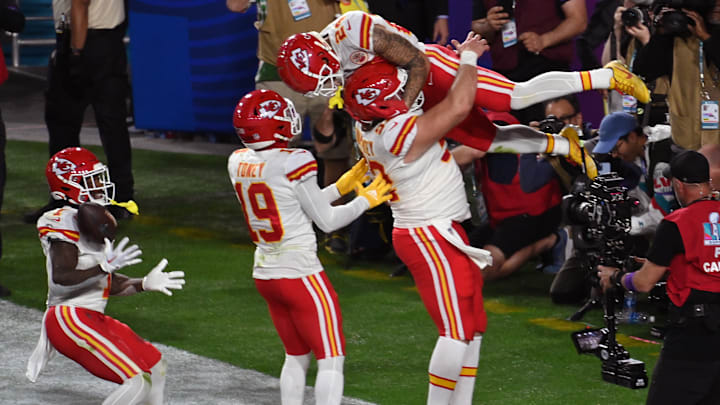It's been 141 days since the Kansas City Chiefs defeated the Philadelphia Eagles 38-35 in Super Bowl 57. Both teams are roughly three weeks from opening training camp, but some players are still finding it difficult to close the chapter on the 2022 season.
Eagles' defensive end Brandon Graham recently made headlines for what he had to say about the playing conditions at State Farm Stadium — the site of SBLVII. "You need that traction to be able to get off the block and we were slipping a lot. I'm telling you that O-line, they got blessed, I'll say that."
In fairness to Graham, he's not wrong. If anyone understands the woeful conditions of the field at State Farm Stadium, it's the Kansas City Chiefs and their accompanying fan base. This was made clear to all parties involved in September of 2022 when the Chiefs visited the Cardinals for their season opener. That game, or more pointedly that surface, cost the Chiefs both their placekicker Harrison Butker and rookie cornerback Trent McDuffie. Both were felled by injuries that Andy Reid attributed in part to loose turf. The tandem would go on to miss a combined 10 weeks of the regular season following Week 1. The surface would again prove insufficient, five months later, on the NFL's biggest stage.
The conversation about the playing surface in Super Bowl LVII has overstayed its welcome.
The problem with Graham's commentary is how he's arbitrarily decided it only had a negative impact on the Eagles' defensive line. That's an absurd proposition for one simple reason: the Chiefs played on the very same surface. Sure, the Eagles had been the most dominant defensive unit in terms of rushing the passer. They led the league with 70 sacks (good for third on the all-time list in a single season). It's one of the primary reasons why so many pundits picked the Eagles over the Chiefs in the Super Bowl.
There's an old adage in professional boxing that "styles make fights." Such is also true for the NFL, as matchups are integral to how games ultimately play out. Theoretically, Philly having the league's best pass rush face the league's best quarterback should've set the stage for one of the great duels in Super Bowl history. In practice, we saw something very different transpire on the night in question. The Chiefs offensive line pitched a shutout and kept Patrick Mahomes clean for all 60 minutes of regulation. We could certainly ascribe that how bad a shape the turf was in, but that's an easy, anti-intellectual way to approach what happened.
The Chiefs, to their credit, posted the league's No. 2 pass rush during the regular season. They amassed a total of 55 sacks during their championship campaign and continued that momentum into the postseason. Some have argued the ability to rush the passer was more central to the success of the Eagles than it was for the Chiefs. Philadelphia was undeniably more productive in that way during the season, but going into the Super Bowl, the Eagles had notched eight postseason sacks in the Divisional and Conference Championship rounds. The Chiefs logged seven over the same span. Generating pressure was no more important to Philadelphia.
So how were the Chiefs able to get home twice in the Super Bowl, as the inferior pass-rushing team, if the turf was such a prohibitive factor in the game? That's perhaps the most irksome part about this entire revisionist conversation. Kansas City was faced with the very same challenges and they found a way to overcome them. Championship teams make adjustments, not excuses. If we're discussing the many variables that affect the outcome of a game, does a hobbled Patrick Mahomes factor into the equation? How about playing with a two-score lead?
It's easy to reduce the outcome to a singular variable once the game is over. The question becomes, why one variable? Why not three? And why that particular variable? It's an easy game to play. In reality, we know there were a number of reasons why the Chiefs ultimately hoisted the Lombardi. The Chiefs are no strangers to the sting of Super Bowl misfortune. Kansas City was trounced in Super Bowl LV to the tune of three scores (falling 31-9 to the Tampa Bay Buccaneers). Were the Chiefs at a disadvantage when multiple injuries forced them to cobble together a makeshift offensive line (some of which played out of position)? I suppose that depends on who you ask, but ultimately injuries are a part of the game. The difference in that case was that there were no excuses being made by the Kansas City Chiefs.
How one deals with adversity is largely what separates the men from the boys in the National Football League. To quote Julius Campbell from Remember the Titans, "attitude reflects leadership." This close to the start of the new season, the focus is ostensibly not the work to get over the hump and win the NFL's top prize. It appears it's passing the buck to excuse one of the toughest losses of Brandon Graham's career. Fortunately for Chiefs Kingdom, that's not the culture Andy Reid and company have cultivated at One Arrowhead Drive.
